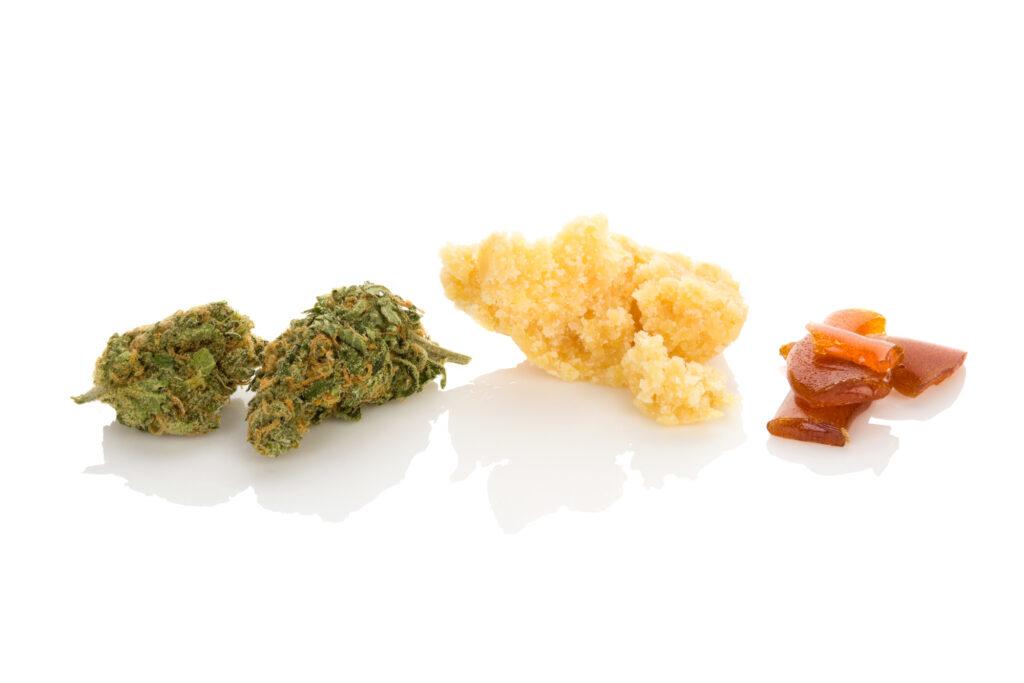In the ever-evolving landscape of cannabis concentrates, enthusiasts and curious newcomers alike often find themselves at a crossroads, drawn into the vibrant debate of THC rosin versus wax. Both forms represent the pinnacle of extraction innovation, offering an intoxicating array of flavors, effects, and textures that cater to diverse preferences and needs. But as with all choices in the world of cannabis, the ideal option can vary substantially based on individual experiences and desired outcomes. In this article, we’ll peel back the layers of THC rosin and wax, exploring their unique characteristics, extraction methods, and the subtleties that set them apart. Join us as we investigate the intricate world of cannabis concentrates to help you determine which one might reign supreme in your journey toward the perfect high.
Understanding the Basics of THC Rosin and Wax
When delving into the world of cannabis concentrates, understanding the intricacies of THC rosin and wax is essential for any enthusiast. Both products are favored for their potency and flavor, yet they differ significantly in composition, extraction methods, and overall experience. THC rosin is a solventless concentrate made by applying heat and pressure to cannabis flower or hash, which preserves a robust terpene profile and delivers a more natural taste. On the other hand, wax typically involves a solvent-based extraction process, often using butane or propane, to produce a concentrated oil that is whipped into a waxy consistency.
One of the key distinctions between these two concentrates lies in their texture and consistency. THC rosin often has a sticky, tacky consistency that can range from a sap-like oil to a more solid substance, depending on the strain and extraction process. Wax, in contrast, is known for its crumbly, opaque texture, which can vary from soft and pliable to hard and brittle. These variations affect how users consume each product.While rosin is frequently enough dabbed or used in a vaporizer, wax is popular for dabbing and can also be sprinkled onto flower for an enhanced experience.
Moreover, the potency and effects of each concentrate can vary significantly. With both rosin and wax typically testing between 60% and 90% THC, choosing the right one frequently enough comes down to personal preference. Some users might prefer the cleaner appeal of rosin, as it retains more natural cannabinoids and terpenes thanks to its solventless production method. Wax, while potent and flavorful, may carry residual solvents depending on the extraction techniques used. This aspect can be especially important for those conscious of the purity of their cannabis products.
To further understand the differences, here’s a speedy comparison:
| Feature | THC Rosin | Wax |
|---|---|---|
| Extraction Method | Heat and pressure (solventless) | Butane/propane extraction (solvent-based) |
| Texture | Sticky, varies from oil to solid | Crumbly to soft |
| Flavor profile | Rich in terpenes, natural taste | Concentrated, but may have residuals |
| Purity | High, no solvents used | Variable, depends on extraction |
Ultimately, the choice between THC rosin and wax depends on individual taste, desired effects, and concerns about purity. Whether opting for the clean, robust flavor of rosin or the diverse texture and effects of wax, both concentrates offer unique experiences that cater to a wide range of preferences in the cannabis community.

Exploring Extraction Methods and Their Impact on Quality
As the cannabis industry evolves, so do the techniques and methodologies for extracting concentrates. Among the various methods available, rosin extraction and butane extraction (used for making wax) stand out in terms of popularity and quality.Each method not onyl affects the potency of the final product but also plays a crucial role in preserving the natural flavors and terpenes of the cannabis plant.
Rosin extraction employs heat and pressure to extract cannabinoids, resulting in a solventless concentrate. This method is praised for its simplicity, environmental friendliness, and the preservation of the plant’s integrity. Consequently, users often find that rosin retains a broader spectrum of terpenes, leading to a superior flavor profile. The absence of solvents also means that the risk of contaminants is significantly reduced,making rosin an appealing option for health-conscious consumers.
Conversely,wax extraction utilizes butane as a solvent to dissolve cannabinoids from the plant material. While this method can yield high-potency products, the efficiency of the extraction process can vary greatly depending on the skill and safety practices of the extractor. It’s essential to ensure that any residual solvents are wholly purged from the final product to guarantee consumer safety. Wax often boasts an intense flavor, but the extraction process may compromise some of the natural terpenes found in rosin.
| Factor | Rosin | Wax |
|---|---|---|
| extraction Method | Heat & Pressure | Butane Solvent |
| solvent | Solventless | Solvent Used |
| Terpene Preservation | High | Variable |
| Health Safety | High | Needs Testing |
Ultimately, the choice between rosin and wax will depend on individual preferences and priorities. For those who prioritize natural flavor and purity without the use of solvents,rosin might potentially be the ideal choice. Conversely, users seeking concentrated potency and robust flavors may find wax to be more appealing, provided that safety practices are adhered to. As consumers become more educated about extraction methods,understanding their impact on quality will be crucial in making informed purchasing decisions.

Comparative Analysis of Potency and flavor Profiles
When it comes to assessing cannabis concentrates, particularly THC rosin and wax, potency and flavor profile are two of the most critical parameters for consumers. Both products stand out in their own right, yet they cater to different preferences and needs, making a thorough comparison essential.
Potency: THC concentration is often the first aspect that consumers consider. Here’s how these two concentrates stack up:
| Concentrate Type | Average THC Content | Effects |
|---|---|---|
| THC Rosin | 60-90% | Strong,often uplifting and clear-headed |
| Wax | 50-80% | Intense,couch-lock potential |
Rosin extraction typically leads to higher potency levels because this solventless method preserves the natural properties of the cannabis plant while concentrating cannabinoids. Wax, while potent, may have a slightly lower THC range due to its extraction process, which frequently enough includes solvents. Thus, for those prioritizing potency, rosin might be the preferable option.
Flavor profiles: The flavor experience is another defining characteristic of these concentrates. Each method of extraction influences not only the THC content but also the terpenes-the aromatic compounds responsible for flavor and scent. Consider the following attributes:
- THC Rosin: Often noted for its rich, full-bodied flavor that retains the essence of the original flowers.
- Wax: While flavorful, it may sometimes have a more muted taste because of additional processing and potential residual solvents.
- Rosin preserves the terpenes better, resulting in a more aromatic and flavorful dabbing experience.
- Wax can vary greatly in flavor depending on the strain used and how it’s processed.
the decision between THC rosin and wax boils down to personal preference in potency and flavor. Enthusiasts who cherish the authentic cannabis experience may lean towards rosin, while those seeking intense high effects might favor wax. Knowing these differences can help consumers make informed choices on their cannabis concentrate journey.

Evaluating the Health Benefits and Risks of Each Concentrate
When diving into the world of cannabis concentrates, the health benefits and risks of each type are paramount to consider. THC rosin, a solventless extraction method, has gained popularity due to its perceived purity and method of production. This concentrate is celebrated for its high potency and the preservation of flavor terpenes, making it an appealing option for those seeking a more natural experience. However, due to its high THC content, it’s essential for users to be aware of the potential psychotropic effects and dosage control, especially for newcomers or those sensitive to THC.
On the other hand, wax is another highly favored concentrate that employs solvents during extraction, which can impact its overall safety profile. Even though wax is frequently enough more affordable and widely available, the use of chemicals in the extraction process raises concerns about residual solvents and contaminants. Users should take care when sourcing wax to ensure it has been properly purged of any harmful substances. While wax often delivers a robust and potent hit, the trade-off lies in the potential health risks associated with less meticulous production methods.
To better understand the comparative health implications, we can look at the following factors:
| Factor | THC Rosin | Wax |
|---|---|---|
| method of Extraction | Solventless | Solvent-Based |
| Purity | High | Moderate |
| Flavor Profile | Rich Terpene Profile | Variable |
| Availability | Limited | Widely Available |
| Health Risks | Low | Higher |
Ultimately, the decision between THC rosin and wax should hinge on personal preferences, health considerations, and individual tolerances. Conducting thorough research and understanding where your concentrate comes from can highlight health implications,guiding you towards a safer and more fulfilling cannabis experience. As always, consulting with a cannabis specialist or healthcare provider can provide invaluable insight tailored to your specific needs, ensuring an informed choice every time.

Tips for Choosing the Right Concentrate for Your Needs
When it comes to selecting the ideal cannabis concentrate, understanding your personal needs and preferences is essential. Both THC rosin and wax offer unique qualities, making the decision a personal journey.Here are some key considerations to guide you:
- Consumption Method: Consider how you plan to consume the concentrate.Rosin is often dabbed or vaporized, providing a clean, flavorful experience, whereas wax can also be smoked or vaporized, offering a different texture and experience.
- Potency Preferences: Check the THC content and overall potency. Rosin typically boasts a higher purity level, making it a great choice for those seeking a powerful effect without the additives that might be present in some wax products.
- Flavor Profile: Each concentrate has its own unique flavor, influenced by the strain and extraction method. If flavor is paramount for you, rosin might be your go-to due to its extraction process that preserves terpenes better.
- Visual Appeal: Sometimes, the appearance can speak to the quality of the concentrate. Rosin tends to have a more appealing, glossy finish, while wax presents a crumbly texture.Choose what visually appeals to you.
Another critical factor to weigh is the cost-effectiveness of your choice. Depending on your budget, rosin usually comes at a higher price point due to its labor-intensive extraction process. In contrast, wax can be more accessible for those who are budget-conscious and still looking for a potent experience. Reviewing your local dispensary or online options can provide insight into pricing averages.
| Feature | THC Rosin | Wax |
|---|---|---|
| Purity | High | Moderate |
| Flavor | Rich and Terpy | Variable |
| Price | Higher | Lower |
| Texture | Sticky | Crumbly |
Ultimately,understanding your individual needs-whether it’s flavor,potency,or budget-will heighten your cannabis experience. Experiment with both concentrates to discover which one best suits your lifestyle, keeping in mind that the world of cannabis concentrates offers something unique for everyone.

Storing and Using THC Rosin and Wax for Optimal Experience
maximizing the benefits of THC rosin and wax hinges significantly on how you store and utilize these concentrates. Both products are known for their potency and flavor, but improper handling can diminish their quality and effectiveness. Key to maintaining their desirable qualities is storing them in a cool, dark place, away from heat and light. Using air-tight containers, preferably made of glass or silicone, can help preserve the integrity of the cannabinoids and terpenes. Remember to keep them out of reach of strong odors and other substances that might affect their flavor profile.
Onc ready for use, ensure your equipment is suitably prepared to enjoy either concentrate. If you’re using a dab rig, it’s essential to have a quality nail or banger made of materials like quartz or ceramic, which can withstand higher temperatures without compromising the flavor. Before dabbing, preheat the nail for an optimal experience, allowing the rosin or wax to vaporize evenly. When dabbing, it’s best to start with a small amount, as both rosin and wax can be quite powerful.
When catering to preferences, consider the different techniques for consumption that can affect the experience. Here are some popular methods:
- Dabbing: For a potent and flavorful hit.
- Vaping: Using a concentrate vape pen offers convenience and discretion.
- Mixing: Combining with flower can enhance aroma and effect.
To further assist in enhancing your experience,maintaining a consistent temperature during dabbing is crucial. Too hot can burn the concentrate,while too cold can lead to a less effective vaporization. Refer to the table below for a general guideline on optimal temperatures:
| Concentrate Type | Optimal Temperature (°F) |
|---|---|
| THC Rosin | 350-400 |
| THC Wax | 380-430 |
Finding what works best for you may take a little experimentation,but by paying attention to storage conditions and consumption methods,you can significantly enhance both the aroma and the potency of your THC rosin and wax.Stay informed and enjoy your experience responsibly!
To Wrap It Up
In the ever-evolving world of cannabis concentrates, the debate between THC rosin and wax continues to capture the attention of enthusiasts and newcomers alike. Each of these products carries its own unique character, extraction methods, and user experiences, making the choice a matter of personal preference rather than a definitive winner. As we’ve explored the intricacies of both,it’s clear that rosin’s solventless purity appeals to those seeking a clean experience,while wax offers a flavorful potency that delights many consumers.
Ultimately, the best concentrate for you will depend on your taste, tolerance, and desired effects. Whether you find yourself gravitating towards the artisanal craftsmanship of rosin or the rich profiles of wax, both options present an chance to elevate your cannabis experience. As you embark on your concentration journey, remember that experimentation is key-what works for one might not resonate with another. So explore, savor, and discover the nuances of each concentrate. The world of cannabis is vast, and within it lies the perfect fit for every palate. Happy dabbing!


